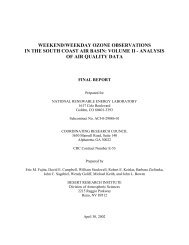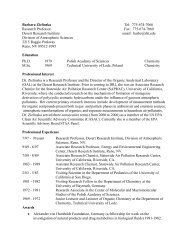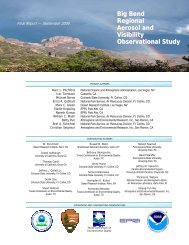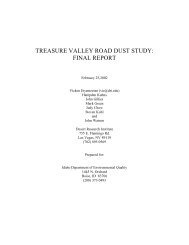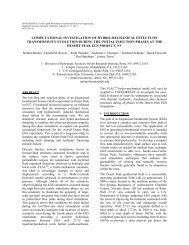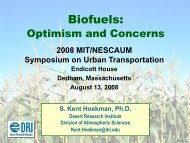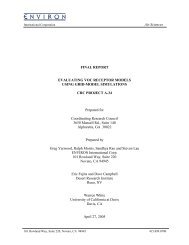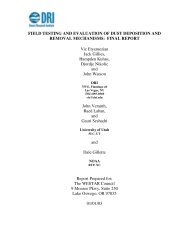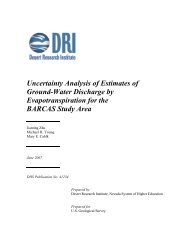Assessment of Conversion Technologies for Bioalcohol Fuel ...
Assessment of Conversion Technologies for Bioalcohol Fuel ...
Assessment of Conversion Technologies for Bioalcohol Fuel ...
You also want an ePaper? Increase the reach of your titles
YUMPU automatically turns print PDFs into web optimized ePapers that Google loves.
distributed production <strong>of</strong> bioalcohols and electricity. In addition, the thermochemical<br />
approach can be used <strong>for</strong> the conversion <strong>of</strong> nearly any biomass feedstocks.<br />
Several novel technologies have also been under development <strong>for</strong> the conversion <strong>of</strong><br />
biomass to bioalcohols. These include processes that employ specially-developed<br />
organisms (e.g., bacteria or yeasts) to produce alcohols, some using shallow pond<br />
systems capturing solar energy, some using syngas from a gasification process.<br />
These are examples <strong>of</strong> potential future technologies that require further research and<br />
scientific validation be<strong>for</strong>e their ultimate potential can be determined.<br />
The U.S. Department <strong>of</strong> Energy (DOE) recently announced (February 2007) an<br />
investment <strong>of</strong> up to $385 million <strong>for</strong> the demonstration and deployment <strong>of</strong> six<br />
biorefinery projects incorporating both biochemical and thermochemical conversion<br />
technologies in Cali<strong>for</strong>nia, Florida, Georgia, Idaho, Iowa and Kansas. The total<br />
investment in these six technologies is projected to total more than $1.2 billion over<br />
the next four years. The DOE grant program will provide a significant boost to the<br />
advancement <strong>of</strong> such conversion technologies. The technology developers<br />
represented by these six DOE grants (Abengoa, BRI, BlueFire, DuPont, Iogen, and<br />
Range <strong>Fuel</strong>s) are among the 38 active technology developers pr<strong>of</strong>iled in Appendix I <strong>of</strong><br />
this report.<br />
Additional opportunities are summarized <strong>for</strong> the commercialization <strong>of</strong> technologies in<br />
Cali<strong>for</strong>nia and the Western United States <strong>for</strong> alcohol fuel production from biomass<br />
feedstocks. The impact <strong>of</strong> high energy prices, geopolitical uncertainty, the growing<br />
focus on clean energy technologies and concern about global climate change are<br />
driving substantial increases in funding from the public and private sectors. There has<br />
never be<strong>for</strong>e been such a wide-ranging opportunity <strong>for</strong> technological advancements in<br />
the area <strong>of</strong> renewable and clean fuels and electricity.<br />
Although U.S. government and private sector support has been increasing rapidly,<br />
much greater financial support <strong>for</strong> research, development, demonstration and<br />
deployment <strong>of</strong> renewable biomass to alcohol fuel and electricity production<br />
technologies will almost certainly be necessary to assure their commercial success.<br />
And, while the majority <strong>of</strong> active development projects identified by this study are in<br />
North America, growing interest in Asia, Europe and South America is also apparent.<br />
This suggests the likelihood <strong>of</strong> increasing worldwide competition <strong>for</strong> the lead in<br />
bioenergy technology development.<br />
5



